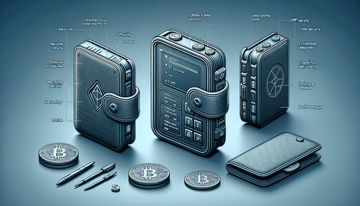Alright, let's get real for a moment. If you're diving into the world of cryptocurrency, you've probably heard the same advice repeated like a broken record: 'Keep your crypto secure!' And honestly, this piece of wisdom is as sound as ever. Enter the crypto hardware wallet, a humble device that's become the unsung hero of the digital currency landscape. But why all the fuss? Well, stay with me, and let's uncover why these pocket-sized vaults are crucial for safeguarding your sacred digital coins.
The Problem with Online Storage
Imagine parking your shiny new sports car in a sketchy alley downtown. Not a smart move, right? Leaving your crypto keys on online platforms is somewhat similar—though your digital assets won't be stripped for parts, they face a slew of cyber threats. Hackers are lurking at every digital corner like modern-day pirates. And while internet-based wallets offer convenience, they also come with hefty risks. You don't want to wake up one day and find your digital fortune vanished into the ether, do you?
Why Cold Storage Is This Cool
Now, let's talk about cold storage. And no, we're not refrigerating your bitcoins. We're talking about offline security. Hardware wallets, like those from Trezor or Ledger, store your private keys offline, immune to cyber theft and malware attacks. It's like having a physical safe that’s only you can access. Hacking an offline device is like trying to rob a bank that doesn't exist on any map—virtually impossible.
The Tech Behind Crypto Hardware Wallets
Alright, tech enthusiasts, gather round. Crypto hardware wallets come packed with some neat technology. They're equipped with secure chips that store your private keys. Plus, they’re designed to sign transactions inside the device, away from prying eyes and malicious intentions. This feature means your keys never leave the safety nest of the wallet.
Why is this important? Because every time you make a transaction online, there's a small window where your information could be vulnerable. Hardware wallets seal that window shut. It's like sending a top-secret letter but keeping the signature sealing wax in your pocket.
Usability: Not as Scary as It Sounds
You might be thinking, 'Great, but how about the user experience?' Good news: it’s not as scary as you might imagine. Manufacturers like Trezor and Ledger have worked hard to ensure basic usability is smooth and intuitive. These wallets usually come with a straightforward setup and easy-to-follow instructions. You won’t need a computer science degree to get started.
Most devices offer simple interaction via a small screen and buttons, guiding you through processes step-by-step. Forget the geeky stuff; consider it more like setting up an old-school phone. User-friendliness is an asset here, not an afterthought.
The Price of Security
Let's tackle the elephant in the room: cost. Yes, these wallets aren’t free. Prices hover between $50 to $200 depending on features, but consider this—can you really put a price on peace of mind?
Think about it. If you're serious about long-term crypto investments, a hardware wallet is a one-time expense to shield thousands, or even millions, worth of digital holdings. It’s like buying a sturdy lock for your door, just a smidge more sophisticated.
Portable Fort Knox
Here’s where it gets fun. You can carry these wallets with you, wherever you go. It's like taking your own personal Fort Knox on vacation. Compact, portable, and built for travel, they’re both a digital nomad's and a tech enthusiast’s best friend.
Getting Started: Your Own Crypto Treasure Chest
If you’ve been convinced about stepping into the realm of hardware wallets, let's chat about getting started. First, research and select a device from reputable brands like Ledger or Trezor. Read reviews, compare features—do some digital window shopping.
Once it’s in your hands, setting it up is usually a breeze. There’s often a helpful startup guide within the box, or you can find plenty of tutorials online. Secure your recovery seed phrase securely—it’s your lifeline, the holy grail to your treasure chest.
What’s Next in the Crypto Journey?
So, you've bolstered your crypto defense with a hardware wallet. What now? Well, with peace of mind, you can explore the exciting opportunities offered by the blockchain world. Whether you're trading, investing, or simply holding onto assets—as a digital nest egg—it’s all a lot more fun when you know your hard-earned crypto stash is secure.
Remember, in the volatile world of cryptocurrency, the winds can shift at any moment. Being prepared isn’t just a strategy; it’s a mindset. Consider your hardware wallet the shield that guards your digital kingdom, ensuring you stay standing no matter what comes your way.
Conclusion: Your Digital Security Blanket
Here’s the deal: in an era where everything is fast-paced and ever-evolving, securing your cryptocurrencies with a hardware wallet is a no-brainer. These devices offer the robust protection you need to ward off unwanted intruders and give you ultimate peace of mind. So, if you're still on the fence, it might be time to rethink and invest in your own digital security blanket.
Ready to make the leap? A touch of caution, solid research, and a well-chosen crypto hardware wallet could be just the thing to set you on a confident path in your digital currency journey. Secure your future today; your crypto safety net awaits.











